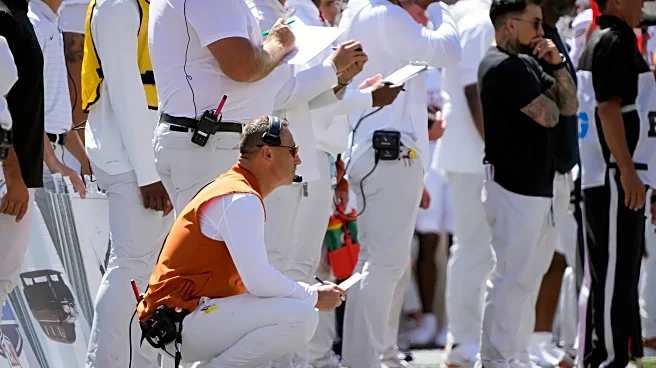Ranked 58th nationally in ESPN’s SP+ metric and coming off an ugly performance against the Kentucky Wildcats that saw the Texas Longhorns manage only 179 total yards, the worst effort in a decade, questions
are beginning to swirl around the capability of head coach Steve Sarkisian to continue calling plays.
As an indication of how poorly things are going for a Longhorns offense that ranks 80th nationally in points per game at 26.7, Sarkisian was asked directly on Monday if he’s ever thought about relinquishing play-calling duties to an assistant.
Sarkisian hasn’t, “because that’s why I got hired — I was a really good offensive coordinator.”
When Texas hired Sarkisian from Alabama, he was in the midst of a national championship run as the offensive coordinator under Nick Saban and was widely regarded as one of the best offensive minds in college football, so it certainly played a large role in the decision by athletics director Chris Del Donte and the administration on the Forty Acres.
But Sarkisian was also hired because of the lessons he’d learned from Saban about operating a behemoth program that found dynastic success. Sarkisian’s experience working under Pete Carroll at USC played a role, too, just like it did when Washington gave him his first head-coaching opportunity.
So Sarkisian’s claim misses an important aspect of that coaching search as he continues to express confidence in himself to handle play-calling duties.
“I believe in what we’re able to do. Every year we have to continually evolve and there’s years we’re going to be better on offense than we are on defense. There’s going to be years we’re better on defense than we are on offense,” Sarkisian said.
“But it’s like if I was the best outside sales guy and then I had a startup company, surely I’m going to go to the sales meetings if I’m trying to sell something, right? And so if that’s one of your strengths, I’m always going to tap into the strengths that I have, and I think being a play caller on offense is one of my strengths. Some may disagree — that’s okay.“
There’s definitely more disagreement with that within the Texas fanbase and perhaps even around college football given the mediocre offensive product the Longhorns have put onto the field this year despite the presence of Arch Manning leading a roster that ranks among the most talented in the country in blue-chip ratio.
Sarkisian has struggled to find an offensive identity this season as Texas made a shift about three weeks ago to become more conservative on offense to complement the nation’s No. 1 defense in SP+.
“We’re playing really good defense, we’re playing really good on special teams, let’s make sure we’re playing a complementary brand of football to continue to enhance the way we’re playing in those two phases, and play in a style to where, hey, we’re protecting the ball, all right, we’re going to play a field position game,” Sarkisian said.
Individual play-calling mistakes have also been more glaring this season for Sarkisian, like the first play of overtime against the Wildcats when the Longhorns called a slower-developing gap scheme instead of a quicker-hitting run that resulted in sophomore right tackle Brandon Baker drawing a holding penalty trying to execute a one-on-one block play side.
Sarkisian also leaves games with some regrets about his play-calling decisions, but said he was most upset about that call only needing a field goal to win the game.
“I didn’t need to risk that holding penalty predicated off of them not scoring it on their session and I didn’t call a direct run, which is really what I should have done in that instance,” Sarkisian said. “I went a little more game-plan mode — I felt like we had an opportunity to create an explosive play, but that puts stress on Brandon, and that style of run that we called has an opportunity to be a negative-type run. So that was not a very good call in the game at all.”
It wasn’t, and it was the type of call that is causing increasing unease with Sarkisian’s ability to retain play-calling duties and still produce an elite, explosive offense that has long been the standard for the Texas head coach.










